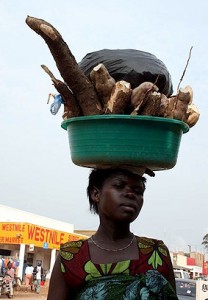Bustling Arua town facing uncertain future
By Simon Jennings
6th Dec 2010
Huddled between the Sudanese and Congolese border in the far north west of the country, Arua is a town that is unfamiliar to many Ugandans. I was last here almost six years ago when I worked for an international NGO in one of the nearby refugee settlements.
Returning recently with the Institute of War and Peace Reporting [IWPR], I was surprised how much had changed. Arua, once the family home of brutal 1970s dictator Idi Amin, served for the last two decades as a sanctuary for thousands of those displaced by conflicts in eastern Congo and South Sudan.
But in recent years, the border town has turned into a bustling trading centre which Sudanese and Congolese there call home. As we drive into town at the end of a sweaty three-hour journey, I see that many of the United Nations and NGO land cruisers that used to line the main street have today been replaced by commercial trucks and privately owned four-by-fours.
Around us, we see labourers working on into the evening. Brightly coloured, office developments are rising up. As if caged in by the wooden scaffolding, the workers toil on, oblivious to the setting sun as we bounce from pothole to pothole along the high street.
The reason for this transformation in the town’s fortunes is clear: the 2005 Comprehensive Peace Agreement which brokered peace between north and South Sudan and opened trading routes right up to Juba and Yei.
Goods produced in Uganda can fetch several times their value when sold north of the border, and the limited infrastructure in South Sudan has made Arua a commercial gateway for anything from food to building supplies. Business is booming.
On the edge of town, we drive alongside an unkempt golf course, once beloved of local NGO workers. A new conference centre, several floors high, overlooks the overgrown fairways. The loyal aid agency clientele that used to spend their late afternoons playing golf are nowhere to be seen. Instead a throng of local children have taken over the fifth hole for a Saturday afternoon football match.
My driver – himself from the north of the country – had never been to Uganda’s West Nile region before. Hotter and drier than the rest of the country, this region – as its name suggests – sits alone on the western bank of the River Nile as it flows north towards Sudan.
Arua was previously isolated from much of Uganda, especially the capital, Kampala. Northern Uganda’s notorious rebel force, the Lord’s Resistance Army, roamed across the region from 1986-2006, making travel treacherous.
But today, salesmen can board the evening bus to arrive in Kampala for breakfast meetings. The peace that has taken hold over the last few years has opened the roads to the Ugandan capital and far beyond.
Arua has long been a place where farmers brought their wares to market from the surrounding district, not to mention an established black market for fuel and cigarettes smuggled over the Congo border.
Today, though, people look further afield to make money: the rich drive shiny four-by-fours – many with number plates from Congo or South Sudan. There’s an air of expectancy in Arua. The imminent referendum on independence in South Sudan could bring what is expected to become Africa’s newest country even closer to its neighbour.
A peaceful outcome to January’s vote would open up business and employment opportunities for Uganda’s whole northern region. Many are already hoping to get jobs as teachers or doctors north of the border. “…The pay is much better and we’d get paid on time,” one hospital worker told me.
But at the same time, people are also braced for a different outcome. Recent hostile rhetoric from Sudan’s capital, Khartoum, means no one is ruling out a call to arms come polling time. Any unrest could see former refugees from South Sudan, who once sought sanctuary in Arua, pouring back into the region.
The refugee camps remain open for such an eventuality: but for now Arua is enjoying the boom. END. Please log into www.ugandacorrespondent.com every Monday to read our top stories and anytime mid-week for our news updates.
Simon Jennings is an IWPR reporter based in The Hague.
![]()


